Turkey tail mushrooms (Trametes versicolor) are truly magical and beneficial creatures of the forest, weaving beauty, mystery, and ecological importance into their role in woodland ecosystems. Here’s why they are so enchanting.
A Tapestry of Colors
The name “turkey tail” comes from their striking appearance. These fungi fan out in layers, showcasing bands of color—deep browns, blues, greens, oranges, and creamy whites. The vibrant patterns mimic the plumage of a wild turkey, making them some of the most recognizable and photographed fungi in the woods.
Their beauty lies in their variability, as no two turkey tails are exactly alike. These mushrooms can teach us to slow down, observe, and appreciate the intricate artistry of nature.
Natures Cleanup Crew
Turkey tails are saprophytic fungi, meaning they decompose dead wood. They are part of nature’s recycling team, breaking down tough lignin and cellulose in fallen trees to turn them into rich, organic material. Without them, forests would drown in their own debris! By facilitating decomposition, they create nutrient-rich soil for new plants to thrive. Their mycelium still contributes to the health of the forest as a whole, connecting life and death in a seamless cycle.
Medicine of the Forest
In traditional medicine, turkey tails are prized for their ability to boost the immune system. They are packed with polysaccharides (notably PSK and PSP), which help enhance immune function. Indigenous peoples and herbalists have long revered them as allies for vitality and resilience.
Where to find turkey tail mushrooms
Turkey tails can be found almost year-round, often appearing on decaying hardwood logs or stumps in temperate forests. They thrive in shady, damp conditions, forming dense clusters that brighten the dull browns and greens of the forest floor. New flushed usually start in the early to mid fall.
Next time you see a turkey tail mushroom, pause and reflect on its quiet role in the forest’s magic. It’s a small, colorful bridge connecting life, death, and rebirth, reminding us that the forest is alive in ways both visible and invisible.
Read more about turkey tail mushrooms on our Meet the Mushrooms!>>
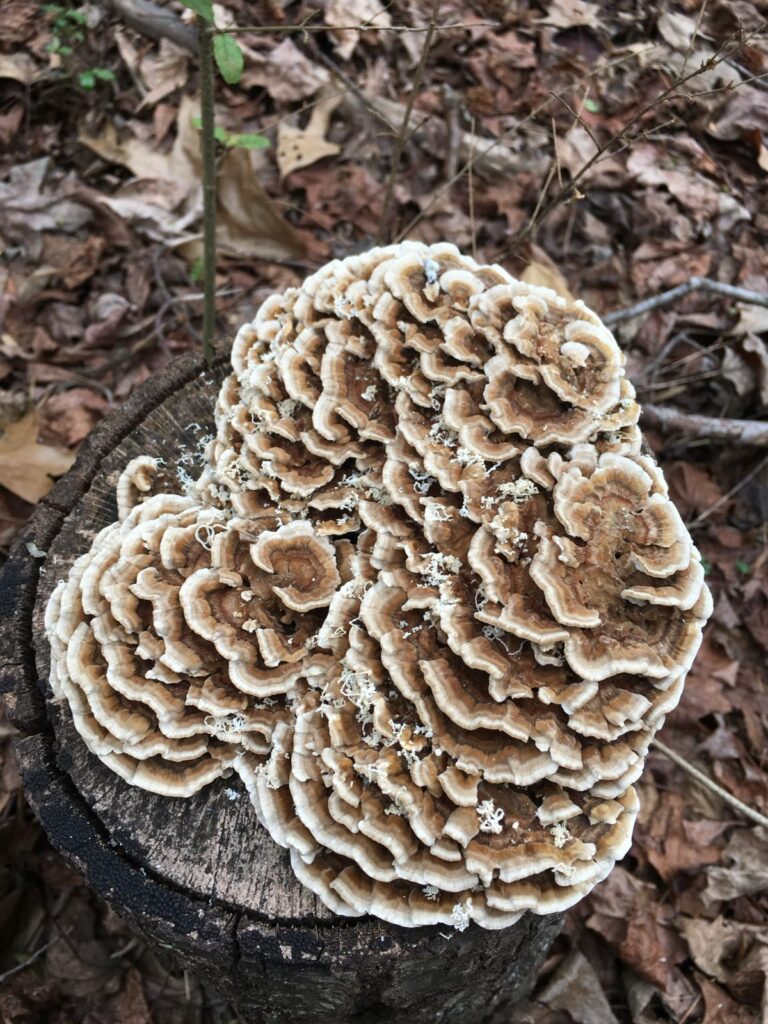
1. Immune System Support: Turkey Tail is known for its immunomodulatory effects, helping to balance and support the immune system, making it beneficial for chronic diseases and autoimmune conditions. It contains polysaccharides, such as polysaccharide-K (PSK) and polysaccharopeptide (PSP), which are used in some countries as adjunct therapies for cancer.
2. Prebiotic Benefits: The mushroom acts as a prebiotic, feeding beneficial gut bacteria and supporting digestive health. This can improve gut health, reduce symptoms of leaky gut, and help control Candida and small intestinal bacterial overgrowth (SIBO).
3. Anti-inflammatory Properties: Turkey Tail has anti-inflammatory effects, making it useful in reducing internal inflammation and symptoms of autoimmune conditions, gut health issues, and general inflammation-related diseases.
4. Support in Cancer Treatment: Turkey Tail is commonly used alongside chemotherapy and radiation. Its immunomodulatory effects can help reduce the side effects of these treatments while boosting immune resilience. Adaptogenic Properties: As an adaptogen, Turkey Tail helps the body adapt to stress and can support hormonal balance, making it a beneficial addition for overall resilience and well-being.
5. Antiviral Properties: Turkey Tail contains compounds that have antiviral properties, which can help manage conditions such as herpes, shingles, and GERD (gastroesophageal reflux disease). It also shows potential in suppressing HIV by inhibiting enzymes like reverse transcriptase and protease, which are essential for HIV replication. Turkey Tail’s unique properties make it a versatile tool for those dealing with immune-related issues, chronic diseases, and those looking for natural ways to support their overall health.
Turkey Tail Mushroom Double Extract with Astragalus and Elderberries
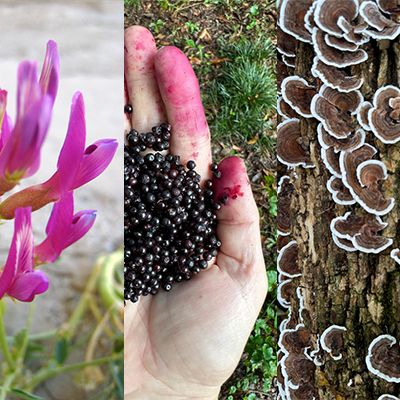
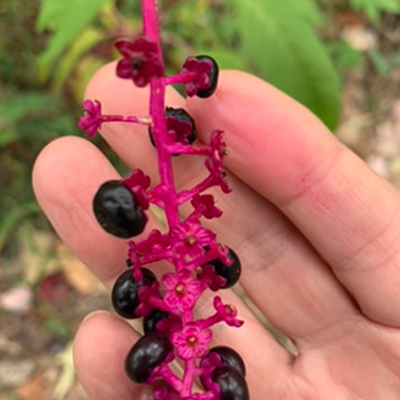
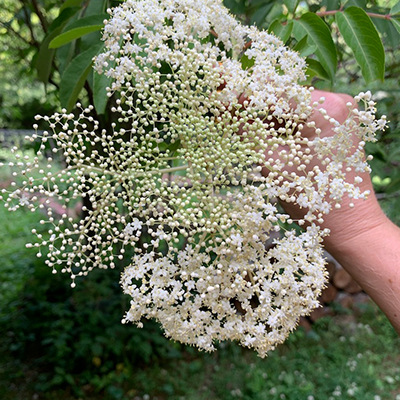
Ingredients
• Dried Turkey Tail Mushrooms (Trametes versicolor): 2 cups, chopped or powdered
• Dried Astragalus Root: 1 cup (immune-supportive)
• Fresh Ginger Root: 1/2 cup, chopped (anti-inflammatory and warming)
• Dried Elderberries: 1/2 cup (antioxidant-rich and antiviral)
• Vodka or Grain Alcohol: Enough to submerge the mushrooms (at least 40% ABV)
• Filtered Water: For decoction
• Optional Honey: For sweetening after extraction
• Place the turkey tail mushrooms, astragalus root, and ginger in a glass jar.
• Pour enough vodka (or grain alcohol) over the ingredients to fully submerge them.
• Seal the jar tightly and store in a cool, dark place for 4-6 weeks, shaking gently every few days.
• After the alcohol extraction period, strain the liquid into a separate jar and set it aside.
• Transfer the strained mushrooms and herbs into a pot. Add elderberries and enough filtered water to cover the ingredients.
• Simmer the mixture on low heat for 2-4 hours, adding water as needed to keep the herbs submerged.
• Let cool, then strain through a fine mesh strainer or cheesecloth.
• Measure the volume of the water decoction. Combine it with the alcohol extract in a 1:1 or 1:2 ratio (water decoction to alcohol).
• Stir well, and transfer the final extract into amber glass bottles for storage.
Take 1-2 dropperfuls (approx. 1-2 mL) daily, or as directed by a healthcare professional.
Store the extract in a cool, dark place for up to 1 year.
This herbal blend balances the immune-boosting properties of turkey tail with the warming and antiviral qualities of ginger, elderberries, and astragalus.

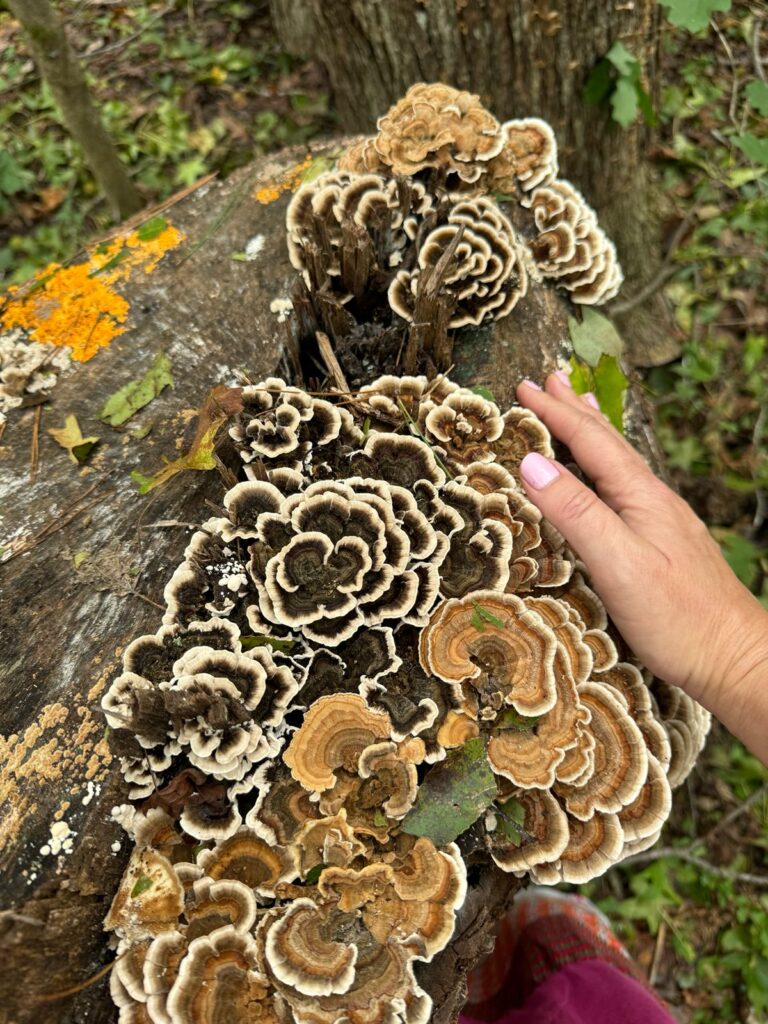

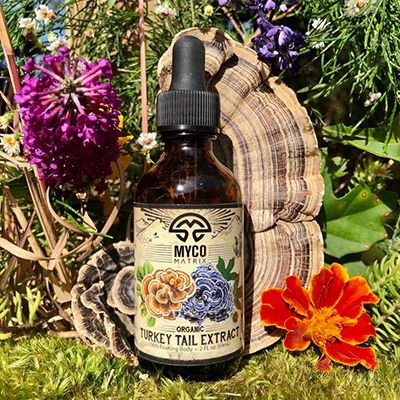
12 thoughts on “The Magical Benefits of Turkey Tail Mushroom with Recipe”
Hi, how can I grow it easily?
Hi Abraham! Turkey tails is very simple to grow actually. You will need fresh cut logs. Here is a handout for you to look through: https://mushroommountain.com/wp-content/uploads/2023/01/PluggingLogsLOW.pdf. Please let me know if you have any other questions.
Hey, how do I order?
Could use the help.
Hey Ryan, give us a shout, and we will take care of you: 864-859-3080.